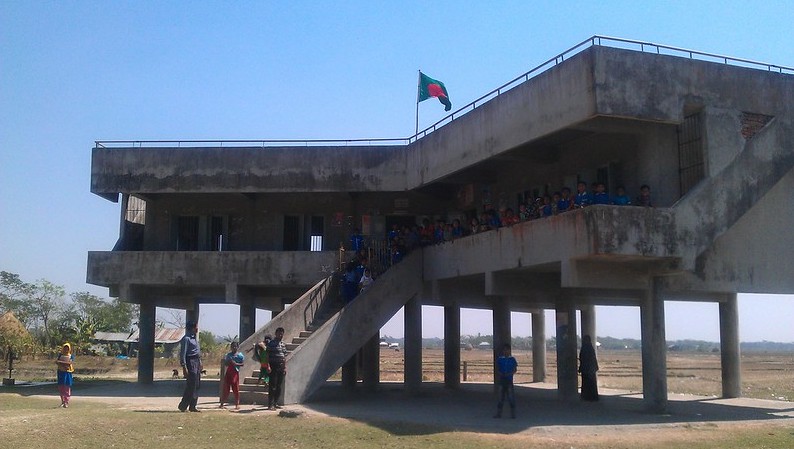Climate finance is one of the building blocks of negotiations at the United Nations Framework Convention on Climate Change (UNFCCC) – money both from public and private sources to help reduce emissions and increase resilience against the negative impacts of climate change.
UNFCCC, the Kyoto Protocol and the Paris Agreement called for financial assistance from Parties with more financial resources to those that are less endowed and more vulnerable.
A study conducted by the International Institute for Environment and Development (IIED) suggested that less than 10 percent of funds committed under different global climate financing windows are being spent to help marginalized communities adapt to climate change impacts and adopt clean energy.
So, the question is why the rate of climate finance reaching the vulnerable people most in need of the money – to cope with impacts such as more heatwaves, rising sea levels, more powerful cyclones or droughts – is not satisfactory and what should be done in order to mitigate this.
‘Mysterious’ seasons harm Nigeria’s farmers who need help with climate change
During the 2015 UN Climate Change Conference in Paris (COP21) parties restated the target of mobilizing $100 billion annually in climate finance by 2020 and agreed to set a more ambitious target by 2025.
A significant portion of these funds is intended to flow through the Green Climate Fund (GCF) focusing on climate change adaptation in developing countries.
To be more effective in helping poor communities in tackling the adverse impacts of climate change and building resilience, it is essential that the global climate funds reach the local level to reduce the vulnerabilities of real affected people.
It is also important to engage local community to maximise the opportunities of mitigation and adaptation actions.
From project planning to implementation; and throughout the monitoring and evaluation stage the active involvement of local institutions can ensure that local needs are addressed properly thus, maximise the benefits of climate finance.
Over the last decade, Bangladesh has made progress, particularly in developing and implementing strategies and frameworks, identifying priorities and establishing institutional arrangements with the support of development partners, UN and other agencies to access and mobilise climate fund.
But to maximise the effectiveness of climate finance reaching the most vulnerable communities and have the most possible impact in enabling climate compatible development, it is essential to introduce more participatory bottom-up approach with the engagement of local governments and local people in the project planning, budgeting, and implementation process.
Despite having several climate change funding instruments under UNFCCC addressing the importance of local institutions and communities clear, so far there is no global target of local level finance.
Establishment of a baseline of local level finance may be useful in this regard to set a target.
Moreover, the funding structure is very important in order to make it more efficient to reach the vulnerable community.
The policies need to be revised in order to increase the readiness to undertake risks for such local initiatives, increase flexibility on co-financing and use more appropriate measurement frameworks that are relevant to local settings.
To improve the delivery of climate finance at local level and make it more effective, it is essential to engage local government, line departments, communities, NGOs and other Civil Society Organisations in the planning and budgeting process of climate initiatives for creating greater scope to respond to specific local vulnerabilities.
Promoting local institutions to adopt transparent and comprehensive budgeting can also contribute significantly to maximising the results of climate finance at local level.
The major barriers preventing finance from reaching local communities include, the absence of specific priorities (e.g. policy gaps), some UN and multilateral agencies being less able to finance small-scale projects directly to local institutions and concerns over the capacity of local communities in mobilising large amounts of finance.
Lack of capacity of local government institutions and NGOs to design and evaluate projects and the complicated application process to access climate finance is another problem, as a result, they have to depend on other channeling institutions.
The present top down financing mechanisms are important for many mitigation and adaptation actions because of having robust monitoring and evaluation protocols that assess the impacts of climate interventions which serve as a basis to judge the effectiveness and efficiency of climate related expenditures.
We need your help… Climate Home News is an independent news outlet dedicated to the most important global stories. If you can spare even a few dollars each month, it would make a huge difference to us. Our Patreon account is a safe and easy way to support our work.
But this approach should also facilitate the engagement of local level for more efficiency, effectiveness, and sustainability benefits.
It is important to engage local beneficiaries and vulnerable communities from planning to implementation phases, promote local private sector entities – specifically Microfinance Institutions (MFIs) or Small and medium-sized enterprises (SMEs), build local-level capacity to access and manage climate finance resources.
Policymakers, researchers, development partners, and practitioners should come forward in advocating for the climate finance to be available for the most vulnerable groups and integrating localised adaptation measures to be prioritised at policy level.
A S M Marjan Nur is a researcher at the Centre for Climate Change and Environmental Research, BRAC University, Bangladesh
